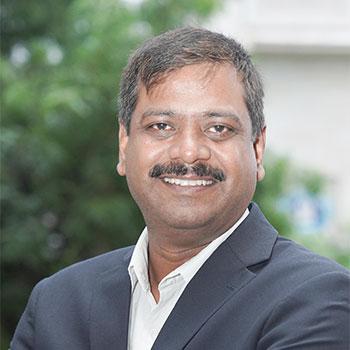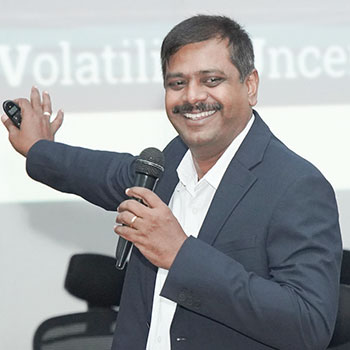Work, To Make An Impact

When you do something, do it with the intent of making a difference or for an impact in somebody’s life, believes George Cardoz, Head HR, Forbes Marshall, a seasoned HR professional with over two decades of experience in the HR industry. In an insightful conversation with Corporate Citizen, Cardoz talks about his unique perspectives about the HR world through his experiences and challenges. He also touches upon the evolving role of HR in today’s business world. Read on…
Corporate Citizen: Take us through your career journey
George Cardoz: I never initially imagined that I’d end up in HR. When I graduated, the field wasn’t even called Human Resources; it was more like Personnel Management. It was actually a friend who suggested I pursue HR (then known as personnel management), because he saw that I had a knack for working with people. That’s how my journey in HR began. After getting started, I pursued my master’s degree, and landing a job at Forbes Marshall was like a dream come true. I always felt that this was the company I wanted to be part of. Forbes Marshall is renowned for its best practices and forward-thinking, people-centric policies, and I’m truly honoured to have been part of this incredible organisation for nearly 23 years now.
This is actually my second stint with Forbes Marshall. I originally joined in 1995 and stayed until 2006, after which I moved on to three different companies over five years. Eventually, I returned to Forbes Marshall to drive specific critical projects, one of the major projects being, setting up the HR function at our Chakan plant, near Pune.
CC: What transitions have you seen in the HR industry in the past two decades?
The evolution of HR has been nothing short of a complete 180-degree transformation, if not more. When I started out, my primary responsibilities, along with others, were payroll and administration—tasks that were heavily manual. Fast forward to today, and those duties now make up less than 5-10% of any HR function. What was once seen as just an administrative or transactional role has evolved into a highly tactical and strategic powerhouse. HR has earned its rightful seat at the boardroom table, where it’s now expected to play a pivotal role in aligning people processes to achieve business objectives.
The role of HR professionals today goes far beyond traditional people administration engagement to talent management. We’re now seen as key contributors to business success, with a clear mandate to drive growth and innovation. But with this expanded role comes a new challenge — HR professionals must continuously upgrade their skills, gain deep insights into the business, understand its unique challenges, and work collaboratively with leadership to overcome those challenges and achieve strategic goals.
"Our thoughts shape our actions, and changing how we think can fundamentally alter what we accomplish. Embracing this process not only enhances personal growth but also unlocks new potentials for success and fulfilment in various aspects of life"
— George Cardoz
CC: What strategies are necessary to stay ahead in this VUCA world?

VUCA (volatility, uncertainty, complexity, and ambiguity) has always been a part of human life, whether in the Stone Age or today. As Charles Darwin once said, “It is not the strongest of the species that survives, nor the most intelligent, but the one most adaptable to change.” Uncertainty is a constant, whether we’re predicting the weather or navigating complex business environments. Even with the rise of data and AI, not everything will go according to plan. This is why preparedness is key.
In a VUCA world, we must adopt a mind-set similar to being on a war footing, always ready for the unexpected. As Sun Tzu famously advised in The Art of War, “In the midst of chaos, there is also opportunity.” We need to be ready for smarter competition, sudden shifts, and unforeseen challenges. The question is, how do we prepare ourselves, our teams, and our organisations to stay ahead. Success in this environment demands adaptability, innovation, and a relentless pursuit of excellence in everything we do.
CC: As an HR professional, how do you foster an inclusive culture in your workplace?
For us, inclusivity has always been a natural part of our culture. I often share this example — when I joined in 1995, we were already practicing inclusion without a formal policy or definition. Even as an engineering and manufacturing organisation, over 25% of our workforce were females. We also had differentlyabled individuals working alongside us—whether it was a visually impaired person in the assembly and packaging section or physically challenged members in the regular workspace. Inclusion wasn’t just a policy; it was simply how we operated.
One of Forbes Marshall’s (FM) core values is “Family Spirit,” and it’s truly lived out in the way it was intended. Everyone who join or is associated with FM is seen as a “Member of the FM Family.” This is why all employees are referred to as “members”—it’s more than just a term; it reflects our deep sense of belonging and inclusion.
CC: What’s your take on talent retention, especially in this era wherein today’s youth switch companies frequently?
In today’s fast-paced job market, where frequent job changes are common among younger generations, organisations must adopt a strategic and holistic approach to talent retention. To build long-term loyalty, companies should develop a compelling Employee Value Proposition (EVP) that emphasises unique benefits and growth opportunities. Gen Z and Millennials are attracted to organisations that reflect their values, such as sustainability, social justice, and ethical practices. They seek companies with clear career development paths, continuous learning opportunities, and a strong commitment to work-life balance, including flexible work arrangements. Additionally, they are drawn to positive, inclusive cultures and technological innovation. Regular recognition, constructive feedback, competitive compensation, and comprehensive benefits also play crucial roles in their decision to join and remain with an organisation. HR must cultivate a culture and environment that meets these expectations to successfully attract and retain this talent. The key focus areas include:
Purpose and Values: Alignment with personal values like sustainability and social responsibility.
Career Development: Clear opportunities for growth and continuous learning.
Work-Life Balance: Flexibility and supportive work environments.
Company Culture: Positive, inclusive, and innovative workplace atmosphere.
Recognition and Feedback: Regular acknowledgment and constructive feedback.
Compensation and Benefits: Competitive pay and comprehensive benefits packages.
CC: How do you leverage automation to enhance the HR process?
I’m a firm believer in the power of technology and automation, viewing them as indispensable tools that enhance HR processes by reducing manual tasks. In today’s landscape, technology has been a significant advantage, particularly in HR, where many of the routine tasks we once managed manually have been automated, dramatically improving operational efficiency. Automation enables us to offload repetitive, transactional work to machines or AI, resulting in more accurate data collection and analysis, which in turn allows for more informed, objective decision-making.
That said, it’s essential to preserve the “human factor” in everything we do. We can’t rely solely on data or system outputs. The insights gained must always be interpreted through a human lens. Since no two situations are ever the same, decisions should be made holistically, taking into account all contextual factors to ensure a balanced, thoughtful approach.
"To move forward, it’s essential to continually upgrade your skills, competencies, and capabilities to meet the demands of the next level"
CC: How have you seen people transforming through your coaching and counselling?
Yes, I’ve witnessed people transform through coaching and counselling, and I strongly encourage everyone to take full advantage of coaching opportunities in their life’s journey. My coaching methodology is deeply personal and aimed at making a real difference. I utilise the 3A’s approach: Aware, Accept, Action. This approach has proven incredibly effective, has had a significant impact for those I’ve worked with. It starts by raising awareness of themselves and their current situation, helping them recognise that to achieve something remarkable, they need to shift their mind-set. By shifting their mind-set, individuals can transform their actions and achieve remarkable results. Our thoughts shape our actions, and changing how we think can fundamentally alter what we accomplish. Embracing this process not only enhances personal growth but also unlocks new potentials for success and fulfilment in various aspects of life.
CC: What trends and innovations will have a significant effect on the HR industry?

With the rise of technology and the competitive hunt for top talent, HR faces new and elevated expectations. Key trends and innovations set to reshape the HR landscape include:
AI-driven talent acquisition: AI will transform recruitment by improving candidate matching, minimising bias, and accelerating the hiring process; making it both more efficient and fair.
Hyper-personalised employee experiences: Data analytics will enable HR to create customised career paths, learning opportunities, and benefits, addressing the individual needs of each employee.
Strategic reskilling and upskilling: In the face of rapid technological advancements, ongoing reskilling and upskilling will become essential, positioning learning and development as pivotal business strategies.
Hybrid work evolution: The shift towards hybrid work will necessitate new leadership models, collaborative practices, and employee engagement strategies, focusing on flexibility and work-life balance.
Predictive people analytics: Predictive analytics will equip HR to anticipate trends in employee engagement, performance, and turnover, allowing for proactive and informed interventions.
Tech-enhanced diversity and inclusion: Cuttingedge tools will drive more effective and measurable diversity, equity, and inclusion efforts, ensuring these initiatives are impactful and sustainable.
CC: What skills should the young management students acquire to join the HR industry?
I believe an all-encompassing approach is essential for success in HR. To start, it’s crucial to be specific about your focus, you need to be passionate about working with people and people processes. A strong orientation towards people is fundamental. In today’s rapidly evolving landscape, where the people space is constantly changing, you’ll need to provide innovative solutions. This extends beyond just addressing people issues; it involves driving business objectives through effective people interventions.
Here are some key skills to develop for the future:
Emotional Intelligence (EQ): Mastering the ability to understand and manage both your own and others’ emotions is essential for building strong relationships, resolving conflicts, and fostering a positive workplace culture.
Data literacy/savvy: Proficiency with HR technologies such as AI tools, Human Resource Information System platforms, and virtual collaboration tools, is crucial. Understanding how to analyse and interpret data will enable you to make strategic decisions and derive actionable insights.
Adaptability and resilience: The dynamic nature of the HR field requires professionals who can navigate changing environments, manage uncertainty, and lead through transformation.
Strategic thinking: Aligning HR practices with broader business goals and thinking strategically will distinguish you as a forward thinking HR professional.
Cultural competence: In a globalised, diverse work environment, being culturally aware and adept at managing diverse teams is increasingly important.
CC: What is your mantra for work-life balance?
Traditionally, work-life balance is framed around three core principles: prioritisation, setting boundaries and presence. This means balancing personal and professional responsibilities, defining clear limits, and being fully present in each area.
However, my perspective shaped by personal experience and evolving work paradigms is somewhat different. In today’s world, where professional and personal activities often intertwine, it’s increasingly difficult to distinctly separate them. The new norm often requires us to perform work related tasks in personal spaces and vice-versa. For me, achieving balance resembles a YinYang concept, where the goal is to harmonise rather than rigidly separate. The skill lies in learning to integrate and balance both aspects of life - professional and personal, because the clear-cut switch between these domains is often impractical.
CC: What’s the best piece of advice you have got that has changed you as a person?
I’ve received several valuable pieces of advice over the years. However, two pieces of advice have truly stood out to me. The first is the belief that “nothing is constant.” Everything in life, including its challenges, is temporary and will eventually change. Like the weather—rainy today, sunny tomorrow, and winter soon after—life moves in phases. How you navigate these transitions depends on your mind-set. Embrace challenges with a positive outlook, and you’ll rise above them; let negativity take over, and the journey becomes far more difficult.
The second is that every phase of life demands a new version of yourself. If you aspire to reach greater heights, you must recognise that the version of you that brought you this far won’t be enough to achieve higher goals. As Marshall Goldsmith aptly put it, “What got you here won’t get you there.” To move forward, it’s essential to continually upgrade your skills, competencies, and capabilities to meet the demands of the next level.
"Everyone who join or is associated with FM is seen as a “Member of the FM Family.” This is why all employees are referred to as “members”—it’s more than just a term; it reflects our deep sense of belonging and inclusion"
CC: What advice do you have for aspiring HR professionals?

As mentioned earlier, if you’re choosing a career in HR, it’s crucial to have a strong people orientation. The complexities surrounding people management will only increase as we move forward, driven by shifts in work dynamics, socioeconomic changes, and evolving workplace expectations. The role of HR will undergo significant transformation, and professionals in this field will need to be better equipped to navigate these complexities.
Moreover, to stay ahead of the curve and be successful, HR professionals need to keep in mind, its core mission is to drive business success. To do so, HR processes, policies, and practices must be precisely aligned with business objectives. At the same time, it’s important to stay grounded, be human, and continuously adapt by embracing the cycle of learning, unlearning, and relearning, ensuring that we stay ahead and make a meaningful impact.